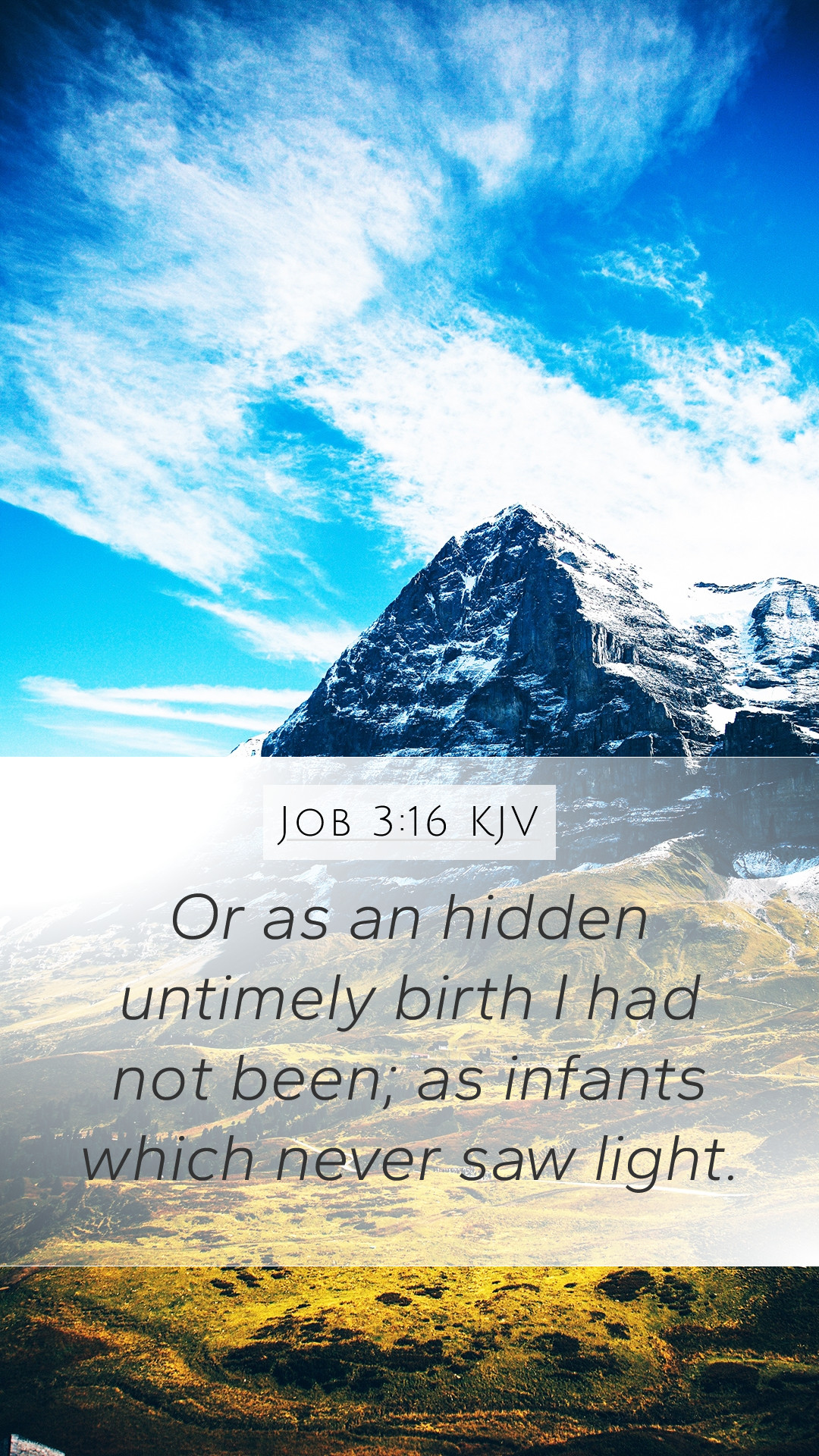Old Testament
Genesis Exodus Leviticus Numbers Deuteronomy Joshua Judges Ruth 1 Samuel 2 Samuel 1 Kings 2 Kings 1 Chronicles 2 Chronicles Ezra Nehemiah Esther Job Psalms Proverbs Ecclesiastes Song of Solomon Isaiah Jeremiah Lamentations Ezekiel Daniel Hosea Joel Amos Obadiah Jonah Micah Nahum Habakkuk Zephaniah Haggai Zechariah MalachiJob 3:16 Meaning
What is the meaning of Job 3:16?
Or as an hidden untimely birth I had not been; as infants which never saw light.
Job 3:16 Bible Verse Meaning
Understanding Job 3:16
Job 3:16 reads:
"Or as an hidden untimely birth I had not been; as infants which never saw light."
Summary of Job 3:16
This verse is part of Job's lamentation on the day of his birth, expressing his wish that he had never been born. It reveals Job's deep sorrow and sense of despair in the face of his suffering. Job contrasts his existence with that of a stillborn child, suggesting that not being born would be preferable to his current state of misery.
Insights from Public Domain Commentaries
-
Matthew Henry:
Henry emphasizes the depth of Job’s misery and his desire to escape the anguish he feels. He interprets Job's longing for non-existence as a reflection of the human condition, particularly in times of suffering. Henry suggests that Job, in his despair, questions the purpose of life and the pain that accompanies it, highlighting the natural human instinct to seek comfort and meaning in moments of despair.
-
Albert Barnes:
Barnes highlights the poetic nature of Job's verse, interpreting the "hidden untimely birth" as a metaphor for unsuccessful life and the suffering that comes with existence. He reflects on the permanence of suffering and hints at the existential questions raised by Job—namely, the value of life when faced with intense grief and suffering.
-
Adam Clarke:
Clarke provides an analysis of Job's state of mind, noting the intensity of his lament. He focuses on the phrase “infants which never saw light,” explaining it within the broader context of Job’s despair. Clarke points out that Job feels that not having been born would spare him the pain he now endures, illustrating the extremes to which human emotion can reach in profound grief.
Interpretations and Applications
The interpretation of Job 3:16 encourages deep reflection on the nature of suffering and existence. It serves as a reminder of the trials individuals face and how feelings of despair can lead to existential questions.
Key Themes
- Despair and Suffering: Job’s words encapsulate the feeling of being overwhelmed by sorrow, something many can relate to in their own times of struggle.
- Existential Questions: The verse evokes questions about the purpose of life, especially when suffering appears overwhelming.
- Hope and Restoration: While Job expresses despair, the larger narrative of Job’s story ultimately focuses on hope and restoration after suffering.
Practical Application
Engaging with Job 3:16 can offer comfort and understanding for those in distress. It highlights the importance of sharing feelings of despair within Bible study groups, enabling connections around shared experiences of suffering. This can guide individuals in their Bible study lessons, seeking answers and hope throughout their journey.
Cross References
- Job 1:21: "Naked came I out of my mother's womb, and naked shall I return thither:" This verse echoes the themes of birth and loss.
- Ecclesiastes 6:3: "If a man beget an hundred children, and live many years, and see no good come of his life..." This verse also addresses the futility of life amid suffering.
- Psalms 58:3: "The wicked are estranged from the womb: they go astray as soon as they be born, speaking lies." Here we see another perspective on life beginning with despair.
Conclusion
Job 3:16 serves as a poignant reminder of the struggles associated with human existence, particularly regarding pain and suffering. Through the insightful Bible verse commentary of Henry, Barnes, and Clarke, we gain a deeper understanding of Scripture that emphasizes the emotional weight felt in moments of extreme distress. As we navigate our own lives, this verse reminds us of the importance of seeking support in our struggles and finding meaning even amidst despair.


